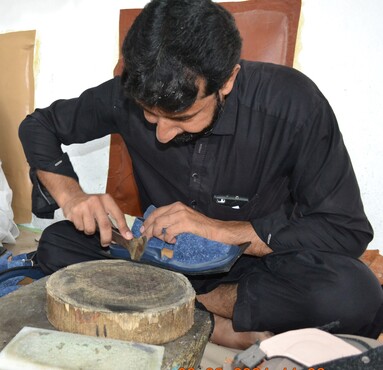Empowering Artisans: A New Path Forward for Charsada's Skilled Workers

In the bustling markets of Charsada, where over 1,500 enterprises and shops uphold the rich tradition of craftsmanship, a quiet but significant transformation is underway. 20 locals are now gaining acknowledgement and advancing their skills through the Recognition of Prior Learning (RPL) initiative, a programme supported by Team Europe and German cooperation and implemented by the Government Leather Technology Institute (GLTI) of Khyber Pakhtunkhwa's Technical Education and Vocational Training Authority (KP TEVTA).
Among these trainees is Mohammed Bilal, who spent years working as a steel mixer in Saudi Arabia before returning to Pakistan in 2016. Struggling to find stable work, Bilal took up daily wage jobs, which barely covered his family's expenses. That changed when the RPL initiative offered him a lifeline. Bilal enrolled in a three-month leatherworking course that focused on shoe cutting and stitching. This allowed him to build upon his existing skills and gain new ones.
From Classroom to Marketplace
Each morning, Bilal and his fellow trainees attended classes at the GLTI to learn the technical aspects of their craft, from the intricacies of leather cutting to the precision required in machine stitching. In the afternoons, they moved from the classroom to the marketplace, applying their newfound knowledge in a practical, real-world environment. Local businesses, like Arif Chappal House, collaborated with the institute to provide this hands-on training. This blend of classroom instruction and on-the-job experience has yielded remarkable results. The trainees quickly became competent workers, adept at crafting high-quality products that meet market demands. Arif, the owner of Arif Chappal House, himself benefited from GLTI support in the past. Noting the initiative’s impact, Arif says:
‘I am satisfied with the training delivery at GLTI’.
Empowering Individuals and Boosting the Economy
Bilal no longer struggles as a daily wager. He now earns a steady monthly income of 30,000 PKR, crafting shoes, chappals, and kheris. Confident in his newly certified skills and the growing demand for quality leather goods, he is even planning to launch his own business.
But the RPL initiative’s impact goes beyond individual success stories. The seven Memorandums of Cooperation signed between the GLTI and local enterprises have established a sustainable partnership that ensures a steady supply of qualified artisans to meet the industry's evolving needs. By providing formal recognition and training, the RPL initiative has given new live to Charsada’s leather industry and strengthened the local economy.
Bilal and his fellow trainees are part of a broader movement aimed at not only reforming Pakistan's technical and vocational education and training sector but also revitalising the nation’s traditional crafts, ensuring that the skills of the past continue to thrive in the future.